Photographs: Hitesh Harisinghani Team Rediff
Three years after the internationally acclaimed beginning to his masterful epic, the Ibis Trilogy, with the Man Booker Prize-shortlisted Sea Of Poppies, Amitav Ghosh returns with a spectacular novel depicting the further adventures of those aboard the Ibis.
Ghosh, who graduated from St Stephen's New Delhi and earned a doctorate in Oxford, began his career as a wordsmith with the Indian Express, before going on to write essays, fiction, seven major novels (The Hungry Tide, The Glass Palace, The Calcutta Chromosome among them) and teaching literature both in India and the United States.
Ghosh appeared on Rediff chat on Friday.
Here is the transcript:
Amitav Ghosh says: Hello there, readers. This is Amitav Ghosh. I am looking forward to hearing from you.
Dfd says: What moved you to pen the River Of Smoke?
Amitav Ghosh says: Dear Dfd, the most important motivation was to follow the career of its main character who is Bahram Modi. Readers of Sea of Poppies will remember him as the father of Ahfatt.
Deepon says: Hi, I am 26 and a big fan! Since your books are so into the history and anthropology of a place or event, I was wondering how an idea of a story forms in your mind? Does the history turn into a story or the story is mixed with the history.
The second question would be: What is with the fascination with human faeces? Every ime you want to show a destitute or crazy guy he's always covered in his own faeces.
Amitav Ghosh says: Dear Deepon, for me all stories start with my characters. It is when I start thinking of my characters that the rest are filled in. As for faeces, incontntinence is one of the notable symptoms for withdrawal from opium addiction.
'Research and the writing go together'
Image: The Glass PalaceNaveenKanchnath says: It is an honour to chat with you Mr Ghosh; thanks to rediff for facilitating this.
The increased number of authors of Indian origin winning Pulitzer and Booker prizes more frequently than before is being attributed by some sections (mostly Anglo-Saxon) as decisions being influenced by publishing houses at the expense of authors from the West, so that more Indians are likely to take to reading of English literature. Your views?
Amitav Ghosh says: Dear Naveen, I have not heard of anything to that effect.
HungryTide says: Dear Mr Ghosh, I loved The Glass Palace. How do you decide how much fiction to mix with fact in such a book?
Amitav Ghosh says: Dear HungryTide, it depends on the nature of the narrative. I mean the stories of each of the characters is fictional, but the backdrop is certainly realistic.
GaneshNadar says: Your books are so well-researched. How much time do you spend researching before you start writing?
Amitav Ghosh says: Dear GaneshNadar, for me, the research and the writing go together. It is not like they are a separate process.
Bablu says: How different is your current novel from previous ones? Will you kindly reply?
Amitav Ghosh says: Dear Bablu, in some ways it is completely different because I have never written about such a character or a setting before. But there are also certain continuities of theme.
'The plot took me just as long as it took to write the book'
Image: Sea of PoppiesSudhanshu says: Dear Amitabh sir, I'm from Bihar from the Ganges where Diti and Kalua, your key characters belong to. While going through the whole novel, I could relate a lot to your bhojpuri poems and local dialects.
While they were awesomely raw, I thoroughly enjoyed them. My question is how long did it take you to develop the plot for Sea of poppies?
Amitav Ghosh says: Dear Sudhashu, to begin with, thank you very much for your kind words about the songs in the book. Actually many of them are taken from songs that were recorded in that area by researchers over a 100 years ago.
The plot took me just as long as it took to write the book. For me the plot is not something I think about and then follow, it is something that evolves organically from my writing.
NaveenKanchnath says: How much did Oxford contributed to your literary life?
Amitav Ghosh says: Dear Naveen, It is hard for me to judge. Certainly, when I was at Oxford, I became aware of different ways of writing and reading English. In that front, I am sure it has contributed a great deal.
But while I was at Oxford, I also traveled and hitchhiked a lot. I traveled around England and I hitch-hiked through north Africa. On these journeys, I learned other languages and other ways of speaking, which were influential to me.
It might interest you to look at my blog which is on my website www.amitavghosh.com. I have posted some of the pictures from my travels, etc.
DT says: Dear Mr Ghosh, I believe you are beyond a measure of doubt the best among the Indian authors to have put English prose on paper. Did you always envision the Ibis books as a triology? How does one do that in the initial phase of character and narrative building?
Amitav Ghosh says: Dear DT, thank you very much for your kind comment, I really appreciate it. When I started writing these books, I knew that there would be more than one book, but exactly how many they would be, I did not know.
So to call it a trilogy was almost an arbitrary decision. It is also because I like the idea of a beginning, a middle and an end. That automatically gives us three parts as it were.
'I really enjoyed Chetan Bhagat's Five Point Someone'
Image: Five Point SomeoneVinayak says: Dear Mr Ghosh, I love your writing. What's your take on the current Indian fiction writing in English? More so, the popular category targetting the youth with the almost Bollywood-y formula?
Amitav Ghosh says: Dear Vinayak, I think this is a very exciting moment for Indian publishing. There are many talented young writers and the publishing industry is growing fast.
The number of readers is growing very fast too. I consider it a good thing and a necessary thing for a mature readership that there be many kinds of writing. No one reads the same kind of books all the time.
Just because I write historical fiction does not mean that I read only books of that kind. I think many of the younger writers are extremely talented. I very much enjoy Chetan Bhagat's first book Five Point Someone.
I admire perhaps even more Amitabh Bagchi's book, which is also set in an Indian Institute of Technology campus. So, I think there is and should be room for many different kinds of writing. Any healthy mind needs a variety in its diet.
Sridhar says: I have read your book Hungry Tide which I bought at Sajnekhali Tiger Camp. It was so related to that place. Great! Do you any association with the place? I searched in internet for mythical place Lucibari!
Amitav Ghosh says: Dear Sridhar, I am glad you went to Sajnekhali, although it does not present a very good idea of the Sunderbans. Lucibari actually does not exist, although many of the other places mentioned in the book are real.
Pp says: Sir, I find myself quite close to Sea of Poppies, tell me honestly...what inspired you to pen it down?
Amitav Ghosh says: Dear Pp, I am glad to know of your reaction to Sea of Poppies.. I find the story of the early migrants from India very exciting and inspiring. In a way, they were heroes I think. I have always wanted to write about them and sea of poppies gave me the opportunity.
'Arundhati is a writer of immense talent'
Image: Arundhati RoyPhotographs: Uttam Ghosh
Pradeep says: Who is your inspiration in writing, and what inspires you in writing exclusively on the opium issue?
Amitav Ghosh says: Dear Pradeep, my writing is not restricted to the opium issue, though it is an important issue. In this book, River of Smoke, you will find much also about paintings, botany and much else. My inspirations are far too many to name.
ADV says: What is your opinion on Arundhati Roy? How would you compare her to other giants who have written about India, such as VS Naipaul and Nirad C Chaudhury?
Amitav Ghosh says: Dear ADV, I think Arundhati is a writer of immense talent and courage. Sometimes, I find myself agreeing with her and sometimes I do not. Yet, I always enjoy the liveliness of her prose, the sharpness of her mind and her willingness to provoke.
There are times also when I think she really surpasses herself. The article she wrote last year on her experiences in Maoist held areas was, I think, one of the finest essays I have ever read.
It is a really important contribution to our national discourse. VS Naipaul has written some great essays as well. But what I like best about his work was his early fiction.
Nirad C Chaudhury's work is occasionally perceptive, occasionally eccentric, and sometimes entertaining. But I don't think he ever has the same degree of political passion and seriousness of purpose as Arundhati.
'My characters are not without links to real characters'
Image: River of SmokeAmlandeep Bhattacharya says: Hello I am from Kolkata, and want to know that what is your comment on loss of intelligentsia in Bengal that we have so less heroes.
Amitav Ghosh says: Dear Amlandeep, I think it is a catastrophe for Bengal. Kolkata's last remaining asset was its educated youth.
Now when I travel between cities on a book tour, no matter where I go, whether it be Hyderabad or Bangalore of Mumbai, I often find myself talking to young Bengali journalists. They all tell me that they have to leave because there were no opportunities in Kolkatta. It is a very sad situation.
Dee says: Which character in the Ibis trilogy is closest to your heart? While a lot of the English/ American characters in the River of Smoke are based on real people from history, did you base any of the key Indian characters on any real people or are they completely fictional?
Amitav Ghosh says: Dear Dee, the characters are all fictional yet they are not without links to real characters. For example, Robin Chinnery. It is a fact that George Chinnery had two illegitimate children with an Indian woman.
Similarly, the character of Neel was based upon a case in the 1820s of a very rich Bengali convicted of forgery and was sentenced to transportation. As for which character is closest to my heart, many of them are close to my heart, but in different ways.
Sg says: Dear Mr.Ghosh, all your books have titles of 3 words. Just a coincidence or ...
Amitav Ghosh says: Dear SG, several of my books don't have titles of three words. Even if they did, it is coincidence.
Deepa says: I just finished reading River of Smoke last week and found the last 100 pages absolutely riveting. Will the third book revisit the Opium Wars or are you planning to transport me somewhere completely different?
Amitav Ghosh says: Dear Deepa, I am so glad you enjoyed the book. I think it was an incredibly exciting moment in history and one that had far reaching consequences. As for the next book, I really do not know where it will go.
Pkghosh says: Amitavaji, your writing on Moritsus people who have converted themselves in to a nativeo f that place, do you find any Chapra (Bihar) connections there?
Amitav Ghosh says: Dear PK Ghosh, there are many, many people from Chapra and Bihar.
'I am not a Maoist sympathiser at all'
Image: Rebels with their weaponsLakhan says: Come on, Dr Ghosh, you know Arundhati will dance on the bodies of the fallen soldiers. Don't give her good intentions like "seriousness of purpose". I hope you are not a closet Maoist sympathiser too.
Amitav Ghosh says: Dear Lakhan, I am not a Maoist sympathiser at all. But I do feel that there are very important issues relating to the forest and indigenous people that need to be brought to the public's attention.
I myself have tried to bring them to public attention for years, as have many other writers such as Gopinath Mohanty, Shivrama Karanth and Mahashweta Devi. Unfortunately, none of us succeeded. Perhaps because we all tried to do it in a very nuanced way.
Arundhati has succeeded in focusing attention on these issues and that in itself is a great achievement. It is a reality that large parts of our country, especially in central and eastern India, are no longer under government control.
Deepa says: How challenging was it to bring together the different dialects/ languages from pidgin to Chinese to Hindustani in the trilogy, particularly River of Smoke? I found the wordplay fascinating and very enjoyable. And thank for the online Chrestomathy..wouldn't have understood a lot of it without it :-)
Amitav Ghosh says: Dear Deepa, It was challenging but extremely enjoyable because I love words and the sound of words. It was one of the most enjoyable parts of writing these books. I am really glad you found the Chrestomathy useful.
Amitav Ghosh says: Please have a look at my website www.amitavghosh.com. You will find the Chrestomathy there and you will also find my blog. It was enjoyable talking to you all. Thank you very much for your questions.

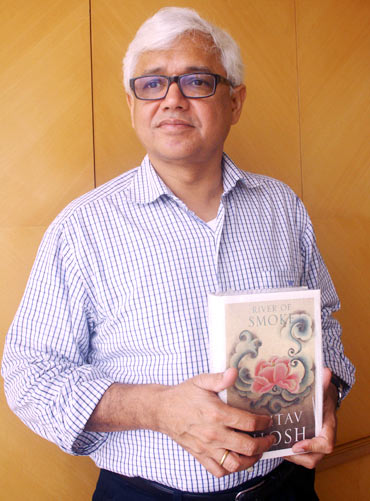
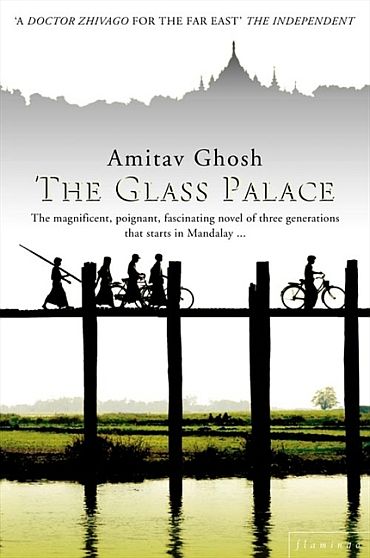
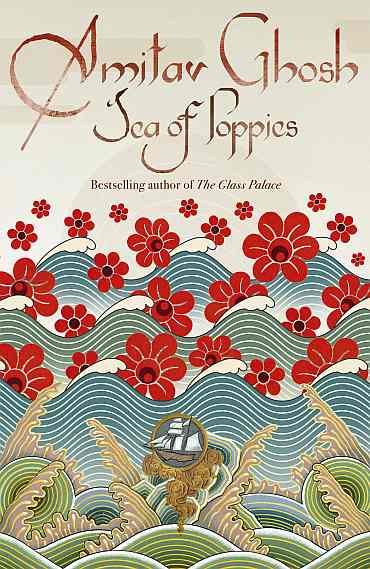
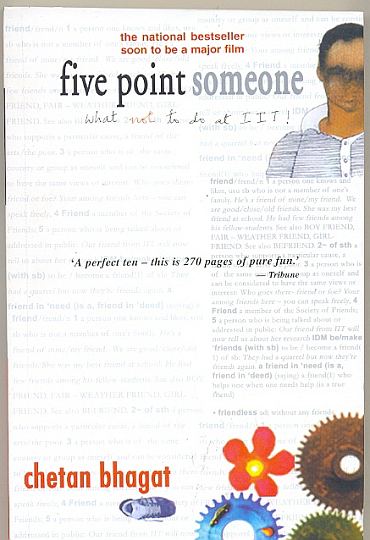
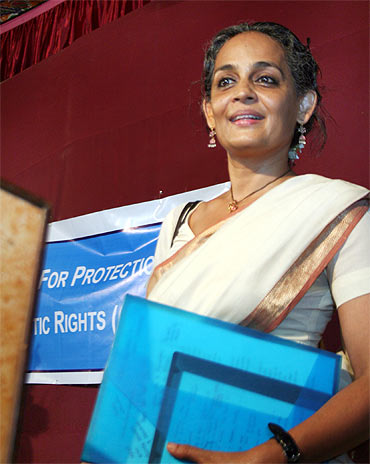
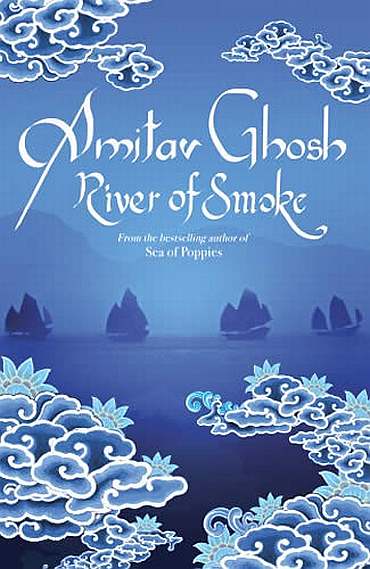
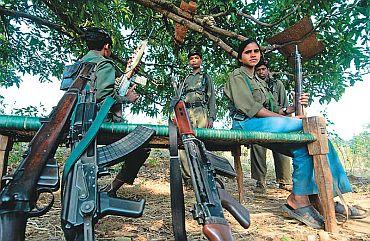
article